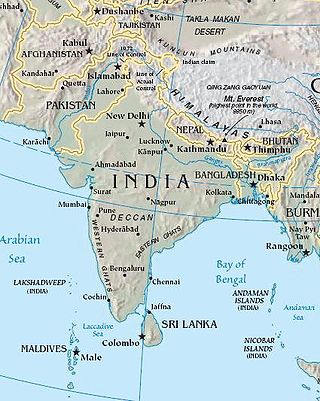Defense or defence may refer to:
Chat or chats may refer to:
Dir, dir, or DIR may refer to:
Form is the shape, visual appearance, or configuration of an object. In a wider sense, the form is the way something happens.
Normalization or normalisation refers to a process that makes something more normal or regular. Most commonly it refers to:
DHA, Dha and dha may refer to:
CSDP usually refers to the Common Security and Defence Policy of the European Union (EU). CSDP may also refer to:
Defence Committee or Defense Committee may refer to:

The concept of an Indo-Pakistani Confederation advocates for a political confederation consisting of the sovereign states of India and Pakistan as a means of ending bilateral conflicts and promoting common interests in defence, foreign affairs, and cultural and economic development. While this idea does not propose to end the sovereign existence of either nation through reunification, it is aimed to resolve the conflicts afflicting the subcontinent since the partition of India in 1947.
Javed, Javaid, Javid, Jawed, or Jawaid Iqbal may refer to:

The Ministry of Defence Production abbreviated as MoDP, is an executive ministry of the federal Government of Pakistan with objectives of development and production of ordnance and machinery for the Pakistan Armed Forces.
The Full spectrum deterrence (previously known as Minimum Credible Deterrence is the defence and strategic principle on which the atomic weapons programme of Pakistan is based. This doctrine is not a part of the nuclear doctrine, which is designed for the use of the atomic weapons in a full-scale declared war if the conditions of the doctrine are surpassed. Instead, the policy of the Minimum Credible Deterrence falls under minimal deterrence as an inverse to the Mutually Assured Destruction, which is widely regarded as designed to dissuade India from taking any military actions against Pakistan, as it did in 1971, when Pakistan started the war. Pakistan refuses to adopt No first use policy, while the other regional powers, India and China, have adopted the policy. Pakistan's foreign minister Shamshad Ahmad had warned that if Pakistan is ever invaded or attacked, it will use "any weapon in its arsenal" to defend itself.

The International Marxist Tendency (IMT) is a Trotskyist political international founded by British-based South African political theorist Ted Grant and his supporters after they broke with the Committee for a Workers' International in 1992. The organization's website, Marxist.com or In Defence of Marxism, is edited by Alan Woods. The site is multilingual, and publishes international current affairs articles written from a Marxist perspective, as well as many historical and theoretical articles. The IMT is active in over 40 countries.
This page is based on this
Wikipedia article Text is available under the
CC BY-SA 4.0 license; additional terms may apply.
Images, videos and audio are available under their respective licenses.


